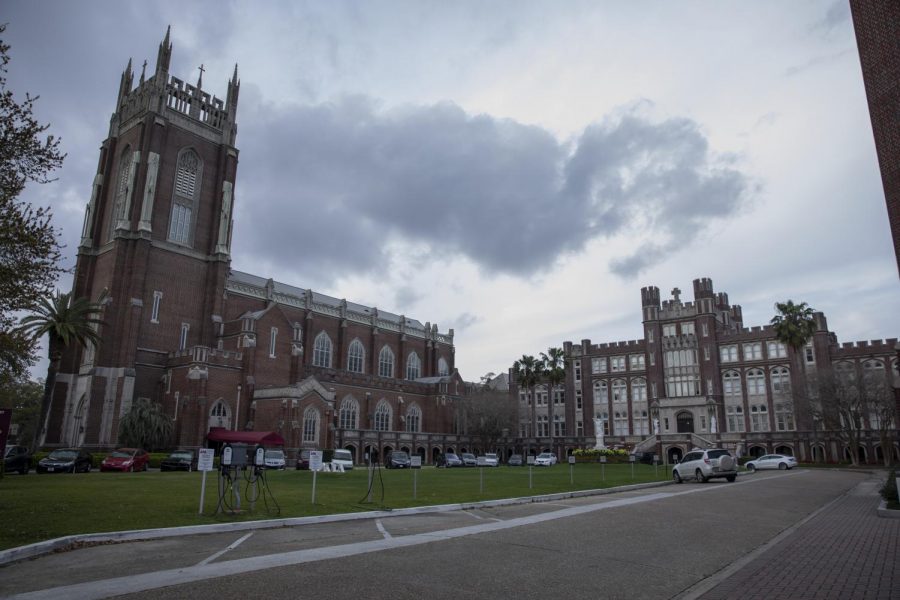What does going online-only mean for Loyola? President Tetlow answers your questions
Holy Name of Jesus stands against the cloudy sky March 11, 2020 after the announcement that classes were going online.
March 11, 2020
While many remain reeling from the news that Loyola courses will go online-only for the remainder of the semester due to the spread of COVID-19, University President Tania Tetlow said she understands how shocking the news is for students and staff.
“This is a really disruptive and disappointing time,” Tetlow said. “The uncertainty is incredibly draining, the anxiety is high all over the world right now.”
To calm this uncertainty, Tetlow sat down with The Maroon to answer some of the most pressing questions about what comes next.
Why Did Classes Shut Down?
Tetlow said the university reached the decision to go online-only after consulting with state and city officials about the spread of the virus, as well as the fact that a faculty member and two undergraduate students, including the Editor-in-Chief of The Maroon had lunch at a journalism conference last week with someone who has since been diagnosed with COVID-19.
“The decision to go online was because we were clearly beginning to see community spread in New Orleans, not just an isolated case born of travel but cases we couldn’t explain because of travel,” Tetlow said.
UNO and Tulane universities also decided to go online to prevent the spread of the virus, but Tetlow said the choice to go online for the remainder of the semester was for students.
“If we were in this interim period where we said ‘We might call you all back,’ for a lot of our students, that travel is not affordable for them and they need to be able to plan,” Tetlow said. “I didn’t want to create a ‘never never land’ of uncertainty for them, we already have enough uncertainty as it is.”
Will Campus Stay Open?
All residence halls will remain open for the rest of the semester and any students choosing to remain on campus must fill out a form by Friday at 5 p.m. However, students staying on campus may be asked to move rooms and will not be allowed any visitors for the remainder of the semester to lower the risk of spreading the virus.
“While we encourage students to go home, we know that for some of our students, they either cannot go home for financial or logistical reasons and some of our students come from places that are sort of on lockdown right now,” Tetlow said.
The campus will also keep up limited dining options focused on To-Go meals available to students in order to avoid gatherings in the dining hall.
Tetlow said hourly employees will not be affected by the process as Sodexo and WFF workers will still be needed to keep campus clean and functioning.
Residential Life will also be updating its page in the coming days to communicate to students.
“This is one of those moments that as incredibly painful as it is, it also shapes who you are as a person,” University President Tania Tetlow said.
What Does This Mean for Graduation?
For graduating seniors, the question swirling around is whether they will get to don a cap and gown and walk across the stage at the convention center. Tetlow said the future of commencement is uncertain.
“I hope very much that commencement will still happen. There is no reason that we need to make a call on that now. So much changes every two hours right now, that we need to wait and see,” Tetlow said.
She said the university may consider delaying the event if necessary until later in the summer.
“There are just too many unknowns right now to be able to say,” Tetlow said.
How Are Classes Going to Work Online-only?
Tetlow said professors will be reaching out to students in the coming days about plans for online-only instruction, something she said they have spent the past year getting ready for in the case of a hurricane evacuation.
“We have been thinking about this and planning and really asking our faculty to be prepared for more than a year. I know that our faculty are being remarkably creative about how to make things work,” Tetlow said.
But she acknowledged that the process will not be easy, and asked that students and faculty alike be patient.
“Between faculty making a change like this that they may have planned for but never done and the nature of technology and hiccups, there will be things that go wrong, but we will figure it out,” Tetlow said. “These systems that we use like Blackboard or Zoom have this massive increase across the country so I have no doubt that they will have some hiccups as well.”
Will This Affect Loyola’s Finances?
“It will definitely have some impact on our finances. We are keeping a careful eye on that but this is one of those hits that will affect all of higher education,” Tetlow said.
What Does This Mean for Loyola?
As someone who survived Hurricane Katrina, Tetlow said that the fear and pain of the situation can force growth.
“This is one of those moments that as incredibly painful as it is, it also shapes who you are as a person,” Tetlow said.









